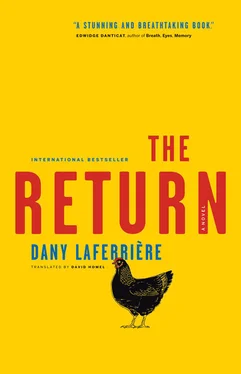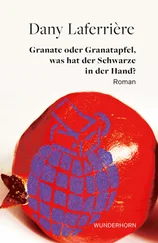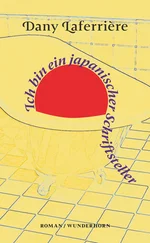Human flesh is meat too.
How long can a taboo
stand up to sheer necessity?
Fleshly desires.
Psychedelic visions.
Sidelong looks.
They’d like to devour
their neighbor for lunch.
Like one of those mangos
with such smooth skin.
A man whispers something into the ear
of his friend who smiles discreetly.
A gentle breeze lifts the woman’s dress
as she runs laughing to hide behind a wall.
Drops so fine
I didn’t realize it was raining.
Pain takes a time out.
This undecided lizard,
after much thought,
jumps from its branch.
A grass-green flash
cuts through space.
I am in this city
where nothing
for once
happens besides
the simple pleasure of being alive
under the blazing sun
at the corner of Vilatte and Grégoire Streets.
Hundreds of paintings covered in dust hang on the walls, all along the street. They look as though the same artist painted them all. Painting is as popular as soccer in this neighborhood. The same luxuriant landscapes remind us that the artist doesn’t paint the real country but the country of his dreams.
I ask that barefoot painter
why he always paints trees bending low
under the weight of ripe heavy fruit
when everything around him is desolation.
You understand, he tells me with a sad smile,
who would want to hang in his living room
what he can see out the window?
What Happened to the Birds?
When I see that teenager sitting by himself
on the branch of a mango tree
strumming away on a battered old guitar,
I understand that amateur musicians
have taken over from the birds.
All that boy needs
is a pair of transparent wings.
A man who knew me thirty-five years ago comes up to me, arms open. With abundant details and flying spittle, he conjures up memories I’d completely forgotten and, worse, that don’t interest me. I try to avoid his eyes as we speak. What started as a wonderful reunion has turned into torture. I’m waiting for him to get to the point: money. In the end he moves on without asking anything of me. I might have underestimated him. As I walk, I try to retrace the thread of his story. Why didn’t I listen to him more carefully? Because of his dirty clothes, his black fingernails, his toothless mouth? If he had been cleaner and more prosperous, would I have paid him more attention? Even if he opened the photo album of my teenage years before my eyes.
This old gentleman slightly bent at the waist
sweeping dry leaves
that have fallen into the courtyard of the city hall.
An activity that must take him all day.
From time to time, he sits down
but gets up with every breath of wind
that brings with it more dry leaves.
Not far away, on a yellow sofa that a little girl has just finished cleaning, two businessmen are chatting as they wait to see the mayor. People’s voices cover the hushed tones of negotiation between these men who have always lived in a world protected by cash.
You have no idea
of the effect that new bills have
on people’s eyes
in a country
where a worker makes
less than a dollar a day.
Last night, in front of the discotheque,
a teenage girl in a red miniskirt
and a tiny yellow blouse
screamed that she wasn’t a whore
because “I don’t want money,
I just want what you can buy
with money.”
I am sitting under the hotel’s almond tree
during the afternoon siesta.
A low pink wall
separates me from the street.
Life is on the other side.
Standing on the bench, I look over the wall at three young women in front of a pyramid of brightly colored fruit. They are talking among themselves so fast I can’t make out what they are saying. Their words interest me less than the beauty of the scene.
What I see in the marketplace
is no different from what I see
in the little painting I just bought.
I look at the two scenes
unable to say
which one imitates the other.
A bird flies swiftly
into the clear hard noonday sky.
So thin but with an astonishing
determination to get as close
as possible to the sun.
It goes so far up
my eyes abandon the quest.
A well-groomed young woman.
Black skirt below the knee.
She crosses the little square quickly
on her way to the phone booth
whose wire has been cut.
She sits down on a bench next to the phone.
Her head between her hands.
Men in black.
Women in tears.
Light rain despite the sun.
The little cemetery, hidden behind the marketplace,
is an oasis of peace.
Women in mourning though not widows
move among the dead
telling of their pain
without fear of being interrupted.
It’s the only spot
where killers never come.
To live on a deforested island
knowing they’ll never
see what is happening
on the other side of the water.
For most people
the hereafter is the only country
they have any hope of visiting.
A dog moves up the street.
Nose skyward.
Tail up.
It runs to the head
of the funeral procession.
I remember the pallbearers of my childhood
who danced with the casket on their shoulders.
Women threatening to throw themselves
into the hole to join their husband.
Frightened dogs running among the graves
while the wind shook the palm trees
like a schoolgirl playing with her braids.
Death seemed so funny to me back then.
Later when I was a teenager
not a day would go by without
the bell tolling for someone.
Each time it made my mother’s blood run cold.
Death that people compared to a journey
set my own mind wandering.
Death could come at any time.
A bullet in the back of the neck.
A red flash in the night.
It appeared so quickly we
never had time to see it coming.
Its speed made us doubt its existence.
Life in the Neighborhood (Before and After)
A quiet neighborhood.
Very discreet.
A vendor sets up her stall
near a wall.
Then a second one comes.
Then a third.
A week later
a new market has sprung up.
And life has changed in the neighborhood.
A man running with sweat
with a white plastic water pail.
He hides behind the low wall
and vigorously washes his face,
neck, torso and armpits.
Then returns to the market.
How can anyone think of other people when they haven’t eaten for two days and their son is at the General Hospital which doesn’t even have enough bandages? But that’s exactly what that woman did when she brought me a cool glass of water. Where does she find such selflessness?
That’s me in the yellowing photograph,
that thin young man from Port-au-Prince
in the terrible 1970s.
If you’re not thin when you’re twenty in Haiti,
it’s because you’re on the side of power.
Not just because of malnutrition.
More like the constant fear
that eats away at you from inside.
I remember the sun beating down on the backs of people’s heads. Dusty street, no trees. We all had the same emaciated look (wild eyes and dry lips). That’s how you could recognize our generation. We used to meet up in the afternoon in a little restaurant near Saint-Alexandre Square, with a view of the lumpy buttocks of anarchist poet Carl Brouard. This son of the solid bourgeoisie had chosen to wallow in the black mud, in the middle of the coal market, to share the poverty of the working-class people. There weren’t just parlor poets tethered to corrupt power back then.
Читать дальше












